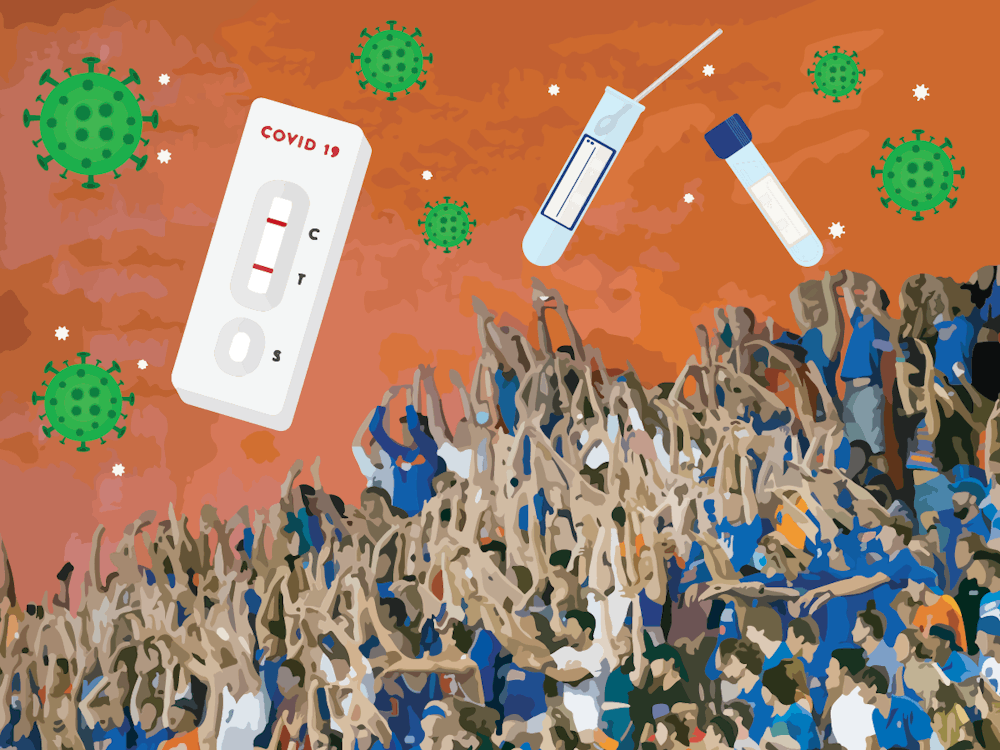As the first day of UF Spring 2022 classes rolls in, some students worry about safety with in-person classes and no mask mandates amid rising COVID-19 cases.
UF Health Screen, Test & Protect discontinued its COVID-19 data dashboard Dec. 31. The on-campus COVID-19 data is now only available through the Florida Department of Health.
“Requests for up-to-date data starting Jan. 1 should be directed to the Department of Health,” Ken Garcia, UF Health spokesperson, wrote in an email.
Some university campuses across the country prepared to go online for the start of the semester. Private universities such as Harvard, Howard and the University of Miami plan to teach classes remotely for a portion of the Spring. In contrast, students and faculty at UF brace for in-person classes.
The decision for classes to remain in-person was made in consultation with UF Health experts and following guidance from the Florida Board of Governors, Garcia wrote. He added that testing is being expanded at Ben Hill Griffin Stadium beginning Jan. 5 but did not elaborate.
Last Friday, UF sent out a campus brief detailing information about the university’s response to the rising COVID-19 cases across Florida. The email encouraged students and employees to get tested, vaccinated — including the booster shot — and wear a mask.
Previously student and staff testing services were provided under UF Health Screen, Test & Protect but transferred to the Student Health Care Center.
Garcia wrote in an email that UF Health Screen, Test & Protect was part of the initial emergency response to the pandemic. The university has now moved to the next phase of its response by transitioning services to local and state health infrastructure, he wrote. Testing and the weekly health screener remain available to students, faculty and staff.
These changes caused concern in the past week as students who attempted to sign up for COVID-19 testing before the start of classes were met with a limited number of testing blocks. As of Jan. 4, there are more available testing blocks.
Brendan Wernisch, a 20-year-old UF chemical engineering junior, tried to sign up for testing on New Year’s Eve. Like previous semesters, Wernisch went to schedule a test through ONE.UF. This time there were no appointments available.
“I wanted to feel safe returning to classes with the spike going on,” Wernisch said. “I thought it was important for my peers, classmates and friends.”
He decided to get tested at a local CVS pharmacy.
It’s important, he said, that with UF’s large population, students and faculty aren’t spreading the disease unchecked around campus and to the outside community.
“In my eyes, we were more prepared at the start of school in Fall 2020 than we are now, and I would expect that UF would be able to meet the moment and proactively make decisions about increasing testing when cases are already increasing,” Wernisch said.
Wernisch expressed that he would have liked for classes to be online for at least two weeks.
“It reduces the risk of the second half of the semester being online,” he said. “I don’t think that we’re following the same guidance that we have been following previous to Omicron, and now it’s a time more than ever when we need to bring that back.”
Brian Iuchyk, an 18-year-old UF accounting freshman, said he’s not feeling very optimistic about the start of the semester.
He believes that not enough is being done to protect the general student body and would like to see mask mandates in certain places, testing requirements and eventually a vaccine requirement.
“I want to feel like someone in the administration cares,” Iuchyk said.
While UF was unable to provide comment on questions about testing availability, the campus brief said the university is “prepared to ramp up testing capacity quickly as needed” and that “as the pandemic evolves, our response to it will evolve as well.”
Contact Lucille Lannigan at llannigan@alligator.org. Follow her on Twitter @lucillelannigan.

Lucy is a senior journalism major and the metro editor for The Alligator. She has previously served as a news assistant and the East Gainesville reporter for the metro desk as well as the health and environment reporter on the university desk. When she’s not doing journalism you can find her painting or spending time outside.






